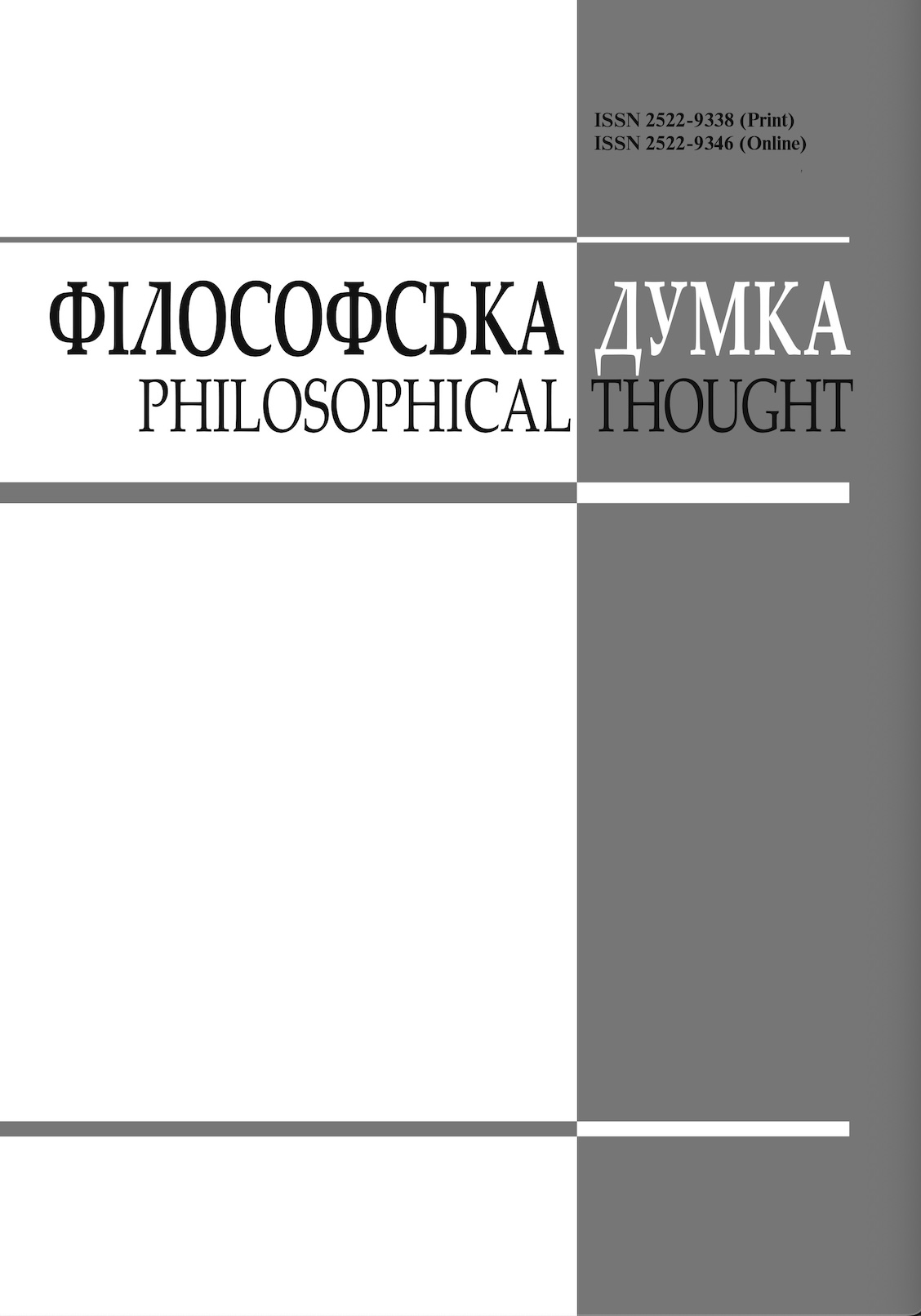CONFUSION OF SUBJECTIVITY: BETWEEN TRAUMA AND (OVER)PASSION
DOI:
https://doi.org/10.15407/fd2024.04.034Keywords:
subjectivity, passiveness, affectedness, trauma, Other, (over)passionAbstract
Purpose is to discover the continuity of explications of subjectivity in the moduses of the structure of affectedness as constitutive for its heterogeneous nature. Theoretical and methodological basis are the principles of the phenomenological description of subjective experience, the means of historical and philosophical analysis, hermeneutical methods of understanding and interpretation. Methodological background is the idea of subjectivity as transcendent in immanent, which is a framework for the non-classical image of a man. The logic of the work is motivated by a shift from a situation of passivity to subjectivity, which is affected by the own history and gains the constitutive experience of trauma, hetero-(auto)affectedness or (over)passion. In the newest French phenomenological and (post)phenomenological studies vulnerable subjectivity, constituting in the moduses of structure of affectedness, is formed due to the exceptional experience of trauma, hetero-(auto)affectedness or (over)passion, which irreversibly (re)creates subjectivity “in spite of itself”. That is, the formation of subjectivity is disturbed by an exceptional experience, which, irrevocably denying the foundations of the subject’s existence, constitutes him “against himself”.
If the heteroaffected subjectivity of J. Lacan and E. Levinas is a passiveness principally, since the traumatic experience of passive “patience”, destroying the narcissistic ideas of subject about yourself, constitutes the subject “against his will”, then in (post)phenomenological research (M. Henri – A. Maldine) explicated between a trauma and an (over)passion subjectivity is formed in the structures of auto-affectedness, which connects passive acceptance of affect with active responsiveness – the response to affect. The continuity of explications of subjectivity in the moduses of the structure of affectedness – from the situation of passiveness to subjectivity, which gains the experience of trauma, hetero-(auto)affectedness or (over)passion, justifies the constitutiveness of affectedness for the heterogeneous nature of subjectivity.
References
Badiou, A. (2009). French. About French as clearing (Évidement). [Trans. from Fr. A.Ryabchuk & V.Artyukh]. [In Ukrainian]. In: B. Cassin, K. Sigov (Eds.), Vocabulaire européen des philosophies: Dictionnaire des intraduisibles (vol. I, рр. 48-54). Kyiv: Duсh i litera.
Bernet, R. (2004). Le sujet traumatisé. In: R. Bernet, Consсience et existence. Perspectives phénoménologiques (рр. 269-295). Paris: PUF [collection «Epiméthée»].
Bernet, R. (2015). Transcendental Phenomenology? In: J. Bloechl, N.de Warren (Eds.), Phenomenology in a New Key: Between Analysis and History. Essays in Honor of Richard Cobb-Stevens (pр. 115-133). Springer [Edition: Contributions to Phenomenology, 72].
https://doi.org/10.1007/978-3-319-02018-1_7
Henry, M. (2000). Incarnation: une philosophie de la chair. Paris: Seuil.
Henry, M. (2003). Phénoménologie non-intentionnelle: une tâche de la phénoménologie à venir. In: M. Henry, De la phénoménologie, T. I. Phénoménologie de la vie (рр. 105-123). Paris: PUF [collection «Épiméthée»].
https://doi.org/10.3917/puf.henry.2003.01
Kozachynska, V. (2016). Subjectivity: Extension of Heterogeneous Spaces (Philosophical-Anthropological Dimension): Monography. [In Ukrainian]. Kyiv: Publishing House of National Pedagogical Dragomanov University. Lévinas, E. (1974). Autrement qu'être ou au-delà de l'essence. La Haye: Nijhoff.
Maldiney, H. (2007). De la transpassibilité. In: H. Maldiney, Penser l'homme et la folie (рр. 263-308). Grenoble: Éditions Jérôme Millon [collection «Krisis»].
Renaut, A. (1989). L'Ère de l'individu. Contribution à une histoire de la subjectivité. Paris: Gallimard.
Zahavi, D. (2011). Unity of Consciousness and the Problem of Self. In: S. Gallagher (Ed.), The Oxford Handbook of the Self (pp. 316-335). New York: Oxford University Press.
Downloads
-
PDF (Українська)
Downloads: 117
Published
How to Cite
Issue
Section
License
Authors who publish with this journal agree to the following terms:
- Authors retain copyright and grant the journal right of first publication.
- Authors are able to enter into separate, additional contractual arrangements for the non-exclusive distribution of the journal's published version of the work (e.g., post it to an institutional repository or publish it in a book), with an acknowledgement of its initial publication in this journal.
- Authors are permitted and encouraged to post their work online (e.g., in institutional repositories or on their website) prior to and during the submission process, as it can lead to productive exchanges, as well as earlier and greater citation of published work (See The Effect of Open Access).


